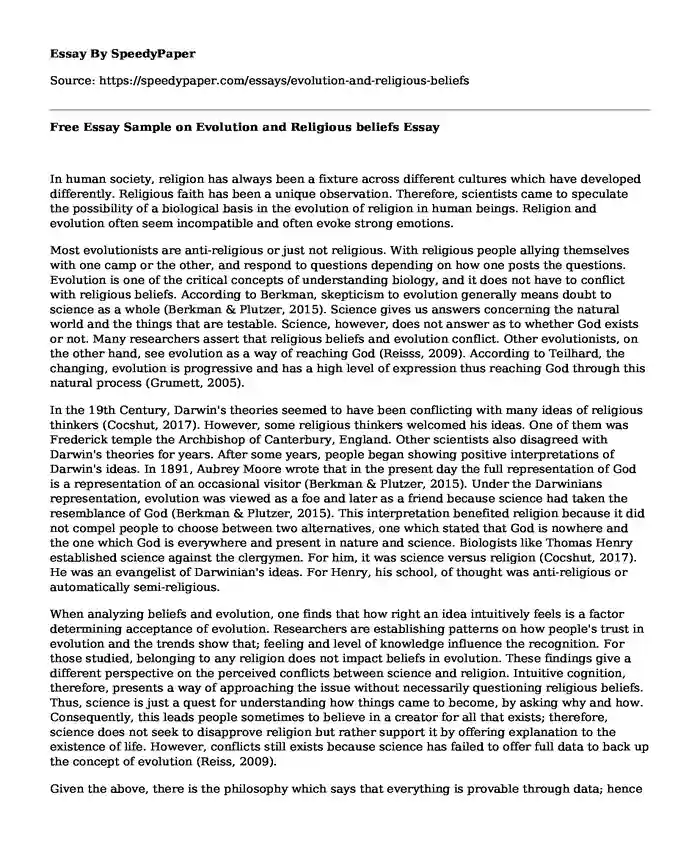In human society, religion has always been a fixture across different cultures which have developed differently. Religious faith has been a unique observation. Therefore, scientists came to speculate the possibility of a biological basis in the evolution of religion in human beings. Religion and evolution often seem incompatible and often evoke strong emotions.
Most evolutionists are anti-religious or just not religious. With religious people allying themselves with one camp or the other, and respond to questions depending on how one posts the questions. Evolution is one of the critical concepts of understanding biology, and it does not have to conflict with religious beliefs. According to Berkman, skepticism to evolution generally means doubt to science as a whole (Berkman & Plutzer, 2015). Science gives us answers concerning the natural world and the things that are testable. Science, however, does not answer as to whether God exists or not. Many researchers assert that religious beliefs and evolution conflict. Other evolutionists, on the other hand, see evolution as a way of reaching God (Reisss, 2009). According to Teilhard, the changing, evolution is progressive and has a high level of expression thus reaching God through this natural process (Grumett, 2005).
In the 19th Century, Darwin's theories seemed to have been conflicting with many ideas of religious thinkers (Cocshut, 2017). However, some religious thinkers welcomed his ideas. One of them was Frederick temple the Archbishop of Canterbury, England. Other scientists also disagreed with Darwin's theories for years. After some years, people began showing positive interpretations of Darwin's ideas. In 1891, Aubrey Moore wrote that in the present day the full representation of God is a representation of an occasional visitor (Berkman & Plutzer, 2015). Under the Darwinians representation, evolution was viewed as a foe and later as a friend because science had taken the resemblance of God (Berkman & Plutzer, 2015). This interpretation benefited religion because it did not compel people to choose between two alternatives, one which stated that God is nowhere and the one which God is everywhere and present in nature and science. Biologists like Thomas Henry established science against the clergymen. For him, it was science versus religion (Cocshut, 2017). He was an evangelist of Darwinian's ideas. For Henry, his school, of thought was anti-religious or automatically semi-religious.
When analyzing beliefs and evolution, one finds that how right an idea intuitively feels is a factor determining acceptance of evolution. Researchers are establishing patterns on how people's trust in evolution and the trends show that; feeling and level of knowledge influence the recognition. For those studied, belonging to any religion does not impact beliefs in evolution. These findings give a different perspective on the perceived conflicts between science and religion. Intuitive cognition, therefore, presents a way of approaching the issue without necessarily questioning religious beliefs. Thus, science is just a quest for understanding how things came to become, by asking why and how. Consequently, this leads people sometimes to believe in a creator for all that exists; therefore, science does not seek to disapprove religion but rather support it by offering explanation to the existence of life. However, conflicts still exists because science has failed to offer full data to back up the concept of evolution (Reiss, 2009).
Given the above, there is the philosophy which says that everything is provable through data; hence there is no God. The other school of thought asserts that beyond science, in the world of the unknown, God exists, which means there could be a possibility that God and science are in alignment. Anyone can subscribe to their own beliefs, but none has relevance to science practices just like it has no more practical significance to one being an officer or a doctor. To sum up, People's religious beliefs or cultures are the main factors determining whether they will accept evolution theories. Although many denominations of religions take compatibility between evolution and religion, many people feel the tension between the two.
References
Berkman, M. B., & Plutzer, E. (2015). Enablers of doubt: How future teachers learn to negotiate the evolution wars in their classrooms. The ANNALS of the American Academy of Political and Social Science, 658(1), 253-270.
Cockshut, A. (2017). Science And Religion In The 19th-Century-Cosslett, T. Cambridge University Press
Grumett, D. (2005). Teilhard de Chardin: theology, humanity, and cosmos (Vol. 29). Peeters Publishers.
Reiss, M. J. (2009). The relationship between evolutionary biology and religion. Evolution: International Journal of Organic Evolution, 63(7), 1934-1941.
Cite this page
Free Essay Sample on Evolution and Religious beliefs. (2022, Jul 15). Retrieved from https://speedypaper.net/essays/evolution-and-religious-beliefs
Request Removal
If you are the original author of this essay and no longer wish to have it published on the SpeedyPaper website, please click below to request its removal:
- Free Essay with a Literature Review on Banks Behavior with Respect to Loan Loss Provisions
- God and the Problem of Evil - Free Essay with Article Analysis
- Free Essay - Cell Phones Create a Barrier to Social Connections
- We Were Soldiers - Movie Review Essay Sample
- Essay Example on the Use of Modified Overt Aggression Scale
- Free Essay: Public Health Leadership and a Definition of Systems Thinking
- Free Essay Sample: The Worst Threats to Humanity
Popular categories





